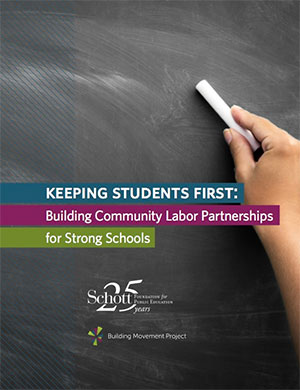Blog
How Can We Build Community Labor Partnerships for Strong Schools?
One of the most inspiring sights of the historic West Virginia teacher strike was seeing educators taking the time to assemble bags of food to deliver to students while schools were closed. In a state in which one in four children is in poverty, the food drive helped struggling families while the strike was ongoing — but it was also an indicator of the kind of labor-community cooperation and solidarity that can achieve important victories, even in the face of daunting political odds.
Amidst an upsurge of grassroots education organizing and mobilization across the country, the Schott Foundation and Building Movement Project are proud to release a groundbreaking new report, “Keeping Students First: Building Community Labor Partnerships for Strong Schools.”
Too often siloed and kept at arm’s length from each other, organized educators, student organizers and organized communities hold much in common and, when brought together in a spirit of equal partnership and respect, can wield a power greater than the sum of of their parts.
This report is designed to support community and labor groups that are ready and willing to engage in meaningful relationship building and collaboration to work together to address systemic and policy issues that have contributed to the achievement gap, especially for youth of color. Centered around case studies of St. Paul, MN and Austin, TX, we found that both unions and community groups there succeeded by bringing each other into strategic development and partnership in a meaningful way.
As we emphasized when we released the Loving Cities Index in February, the issues affecting students extend far beyond the schoolhouse doors. The Index reinforces how important it is to catalyze cross-sector partnerships and collaborations to build public support and political will to ensure cities do right by their children.
Keeping Students First is a roadmap for building those partnerships, but it isn’t a shortcut. Establishing new collaboration and taking on challenging issues often requires us to engage in difficult conversations. All parties must approach these conversations and the language used to describe the issues with care.
In addition to the case studies, the report distilled some of the lessons learned into sample exercises designed to support labor and community groups beginning to work together to explore how to better support students, strengthen new relationships, and win.
No one is coming to save our children and create the equitable systems that they deserve: it’s up to us. We hope that this report will help us all face this task together, united.



